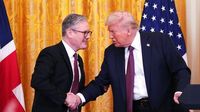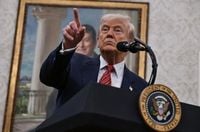In a significant development for transatlantic relations, President Donald Trump announced on Thursday morning, May 8, 2025, that the United States and the United Kingdom have reached a new trade deal. The agreement, touted as "full and comprehensive," aims to solidify the longstanding partnership between the two nations for years to come.
In a post on his social media platform, Truth Social, Trump expressed his enthusiasm, stating, "The agreement with the United Kingdom is a full and comprehensive one that will cement the relationship between the United States and the United Kingdom for many years to come. Because of our long time history and allegiance together, it is a great honor to have the United Kingdom as our FIRST announcement." This announcement follows a press conference held at 10 a.m. in the Oval Office, where more details about the trade agreement were expected to be revealed.
Sources indicate that the administration is also set to provide updates on ongoing negotiations with other countries, which Trump noted are "in serious stages of negotiation." The announcement comes on the heels of significant market volatility caused by tariffs imposed last month, which have led several companies to retract their full-year projections.
Prime Minister Sir Keir Starmer, who had initially planned to commemorate the 80th anniversary of VE Day, found himself addressing the trade deal instead. He acknowledged the ongoing talks with the U.S., stating, "Talks with the US have been ongoing and you’ll hear more from me about that later today. But make no mistake, I will always act in our national interest, for workers, businesses and families, to deliver security and renewal for our country." Starmer's remarks emphasize the importance of the agreement for British workers and industries.
In the context of the recent sweeping tariffs imposed by Trump on April 2, which included a 10% levy on all UK exports and a 25% charge on steel, aluminum, and cars, the new trade deal is seen as a crucial step. The UK government has been actively pursuing a deal to mitigate the impact of these tariffs, which have created considerable uncertainty in the market.
Downing Street has made it clear that lowering food standards remains a "red line" in negotiations for any U.S. trade deal. Environment Secretary Steve Reed emphasized that the government is committed to maintaining high environmental and welfare standards, a point that has been echoed by other officials. Reed stated, "Of course, there have been no announcements yet so I won’t be able to pre-empt what those might be, but we have been crystal clear – we have red lines in this. We will not be allowing British farmers to be undercut on environmental or welfare standards in the way that the Conservatives did when they agreed a trade deal with Australia that undercut British farmers and caused immense damage to them."
Bank of England governor Andrew Bailey welcomed the expected announcement, stating, "It will help to reduce uncertainty. The UK is, though, a very open economy and is affected by the tariffs affecting other economies. I say that because I hope the UK agreement, if it is the case this afternoon, is the first of many. It is excellent that the UK is leading the way and I do congratulate all those involved." This sentiment reflects a broader hope that the trade deal will stabilize the UK economy and foster future agreements.
Starmer's visit to the U.S. in February had opened the door to discussions about a potential deal without tariffs. Trump had previously remarked, "He (Keir Starmer) was working hard, I'll tell you that. He earned whatever the hell they pay him over there, but he tried. I think there's a very good chance that in the case of these two great, friendly countries, I think we could very well end up with a real trade deal where the tariffs wouldn't be necessary. We'll see." This exchange highlights the personal dynamics at play in international trade negotiations.
In addition to the U.S.-UK trade deal, the UK government recently finalized an agreement with India, which promises significant tariff reductions on Scotch whisky and car exports to the Indian market. This dual approach to trade negotiations underscores the UK's strategy to diversify its economic partnerships post-Brexit.
As the day unfolded, the Prime Minister addressed a gathering at the Jaguar Land Rover plant in Solihull, where he emphasized the significance of the trade agreement for the automotive industry. He stated, "This is a really fantastic, historic day between our two great countries. I think it’s a real tribute to the history we have of working so closely together." His remarks were aimed at reassuring workers about the positive implications of the trade deal.
However, the announcement's timing caught many off guard, including members of the press, who were initially sent to the wrong location for the Prime Minister's address. This miscommunication highlights the frenzied pace of the negotiations and the urgency with which the government is approaching the trade deal.
Despite the challenges and complexities surrounding the negotiations, Starmer expressed his determination to secure a beneficial agreement for the UK. He remarked, "I am not ashamed of wanting to get a deal over the line and wanting to do so in a timely manner." This statement reflects the pressure on the government to deliver results amidst a backdrop of economic uncertainty and political scrutiny.
As the UK prepares to navigate its post-Brexit landscape, the implications of the U.S.-UK trade deal will be closely monitored by both businesses and consumers. The hope is that this agreement will pave the way for more fruitful partnerships and bolster the UK economy in the coming years.





